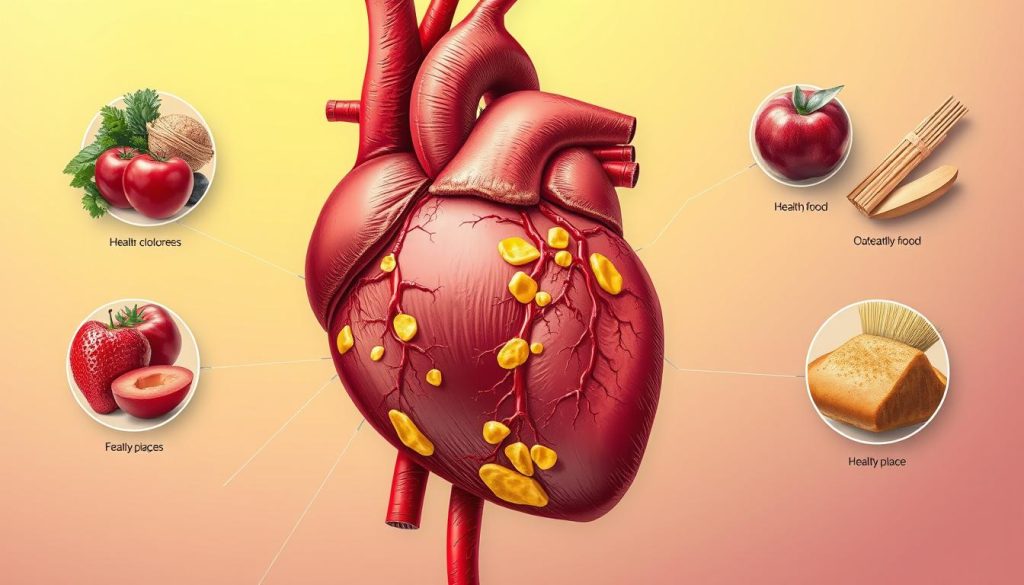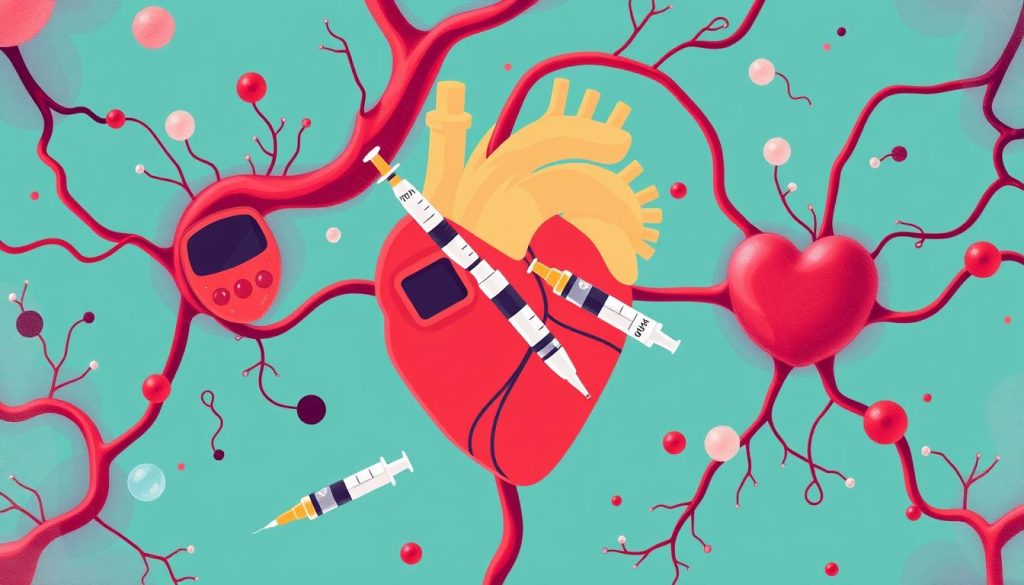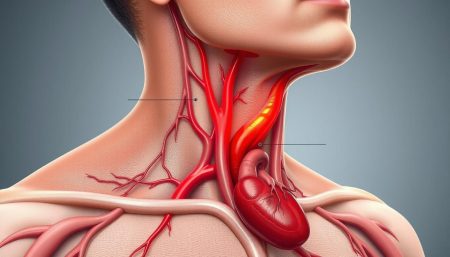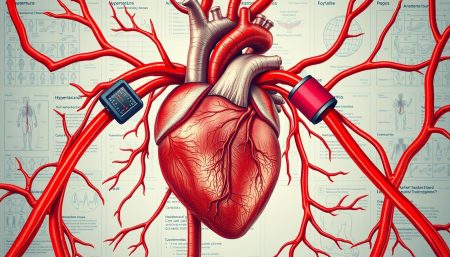Cardiovascular disease is a big health problem around the world. Knowing the risk factors is important for prevention and keeping your heart healthy. Many things can affect your risk of heart problems, from lifestyle choices to genetics.
This guide will cover the main risk factors for cardiovascular disease. We’ll talk about both things you can control and those you can’t. By understanding these risks, you can take steps to protect your heart. Let’s explore the factors that affect heart health and learn how to prevent them.
Understanding Cardiovascular Disease: A Comprehensive Overview
Cardiovascular disease includes many heart and blood vessel problems. These issues are big health threats worldwide. So, preventing them is key to keeping our hearts healthy.
Definition and Types of Cardiovascular Diseases
Cardiovascular diseases cover a wide range of heart and blood system issues. Common ones are coronary artery disease, heart failure, and stroke. Each affects different parts of the heart and blood system, causing different symptoms and problems.
Global Impact and Statistics
Heart disease statistics show its huge global impact. These diseases kill millions every year, making them the top cause of death. In the U.S., someone dies from heart disease every 34 seconds.
| Region | Annual Deaths | Percentage of Total Deaths |
|---|---|---|
| Global | 17.9 million | 31% |
| United States | 659,000 | 25% |
| Europe | 3.9 million | 45% |
Why Prevention Matters
Preventing cardiovascular diseases is very important. By living a heart-healthy lifestyle, we can lower our risk. This includes regular exercise, eating right, and managing stress. Also, getting checked regularly can help catch problems early.
“Prevention is better than cure. This age-old adage holds specially true for cardiovascular health.”
Knowing about cardiovascular diseases, their global impact, and the need for prevention helps us take care of our hearts. By being informed and making healthy choices, we can fight these serious conditions.
What Are The Risk Factors For Cardiovascular Disease
Understanding the risk factors for cardiovascular disease is key to heart health. Knowing these factors helps in preventing and managing heart issues. Let’s look at what affects your heart’s health.

Risk factors for heart disease are divided into two groups: modifiable and non-modifiable. Modifiable factors are things you can change through lifestyle. Non-modifiable factors are things you can’t change.
Modifiable risk factors include:
- High blood pressure
- High cholesterol levels
- Smoking
- Physical inactivity
- Obesity
- Diabetes
Non-modifiable risk factors are:
- Age
- Gender
- Family history
- Ethnicity
A thorough heart health assessment looks at both types of risk factors. Healthcare providers use this to make plans to lower heart disease risk. They tailor these plans to fit your needs.
| Risk Factor | Impact on Heart Health | Prevention Strategy |
|---|---|---|
| High Blood Pressure | Damages artery walls | Regular exercise, low-sodium diet |
| High Cholesterol | Builds up plaque in arteries | Heart-healthy diet, medication if needed |
| Smoking | Reduces oxygen in blood, damages vessels | Quit smoking programs, nicotine replacement |
| Obesity | Strains heart, increases other risks | Balanced diet, regular physical activity |
By tackling modifiable risk factors and knowing non-modifiable ones, you can improve your heart health. Regular check-ups and making lifestyle changes are important. They are key to preventing cardiovascular disease.
High Blood Pressure: The Silent Killer
High blood pressure, or hypertension, quietly damages your body for years before symptoms appear. It affects millions, raising the risk of heart disease and stroke. Knowing your blood pressure readings is key for managing it well.
Understanding Blood Pressure Readings
Blood pressure is measured in two numbers. The first number is when your heart beats. The second is between beats. A normal reading is below 120/80 mmHg.
| Category | Systolic (mmHg) | Diastolic (mmHg) |
|---|---|---|
| Normal | Less than 120 | Less than 80 |
| Elevated | 120-129 | Less than 80 |
| Stage 1 Hypertension | 130-139 | 80-89 |
| Stage 2 Hypertension | 140 or higher | 90 or higher |
Impact on Heart Health
Hypertension makes your heart work harder. This can lead to a thickened heart muscle and heart failure. It also damages blood vessels, increasing the risk of heart attacks, strokes, and kidney problems.
Prevention and Management Strategies
Effective blood pressure management involves lifestyle changes and sometimes medication. Key strategies include:
- Eating a heart-healthy diet low in sodium
- Regular physical activity
- Maintaining a healthy weight
- Limiting alcohol consumption
- Quitting smoking
- Managing stress
By taking these steps, you can reduce your risk of hypertension and protect your heart health for years to come.
The Role of Cholesterol in Heart Disease
Cholesterol is key to heart health. It’s a waxy substance in our blood that helps build cell membranes and make hormones. But too much can cause big heart problems.
A lipid profile test checks your blood for different cholesterol types. LDL (bad) cholesterol can clog arteries, raising heart disease risk. HDL (good) cholesterol helps clear out bad cholesterol.

High cholesterol can cause plaque buildup in arteries. This is called atherosclerosis. It narrows blood vessels and can lead to heart attacks and strokes.
“Managing your cholesterol levels is key to maintaining a healthy heart. Regular exercise, a balanced diet, and in some cases, medication can help keep your cholesterol in check.”
To keep cholesterol healthy:
- Eat lots of fruits, veggies, and whole grains
- Choose lean proteins and avoid saturated fats
- Stay active
- Don’t smoke
- Keep a healthy weight
Knowing your lipid profile and working with your doctor can lower heart disease risk. Regular check-ups and lifestyle changes are important for heart health.
| Cholesterol Type | Desirable Level (mg/dL) | Risk Level (mg/dL) |
|---|---|---|
| Total Cholesterol | Less than 200 | 240 or higher |
| LDL (Bad) Cholesterol | Less than 100 | 160 or higher |
| HDL (Good) Cholesterol | 60 or higher | Less than 40 |
Smoking and Its Effect on Heart Health
Smoking is a big risk for heart disease. It damages blood vessels and raises the chance of heart attacks and strokes. Let’s look at how smoking affects the heart and why quitting is key for a healthy heart.

Direct Impact on Blood Vessels
Smoking harms blood vessels in many ways. It lowers oxygen in the blood, raises blood pressure, and makes blood clot more easily. These changes can cause arteries to narrow and harden, raising heart disease risk.
Secondhand Smoke Risks
Secondhand smoke is as dangerous as smoking. People exposed to it have a 25-30% higher risk of heart disease. This is a big worry for kids and non-smoking adults living with smokers.
Benefits of Quitting
Quitting smoking brings quick and lasting heart health benefits. Within 20 minutes, heart rate and blood pressure start to fall. After a year, the risk of heart disease is cut in half compared to a smoker.
| Time After Quitting | Heart Health Benefit |
|---|---|
| 20 minutes | Heart rate normalizes |
| 12 hours | Carbon monoxide level drops to normal |
| 1-9 months | Coughing and shortness of breath decrease |
| 1 year | Heart disease risk halves |
| 5 years | Stroke risk reduces to that of a non-smoker |
Quitting smoking is one of the best things for your heart. It’s never too late to quit and start improving your heart health. If quitting is hard, look into ways to boost your health to help with quitting.
Diabetes and Cardiovascular Complications
Diabetes is a big risk for heart health. People with diabetes are more likely to get heart disease. Keeping blood sugar levels in check is very important.

The relationship between diabetes and heart problems is complex. High blood sugar can cause inflammation and fatty buildup in arteries. This is called atherosclerosis. It makes blood vessels narrow, raising the risk of heart attacks and strokes.
“Managing diabetes is key to protecting your heart. Regular check-ups and lifestyle changes can make a big difference.”
Managing diabetes well involves several steps:
- Monitoring blood glucose levels regularly
- Following a heart-healthy diet
- Engaging in regular physical activity
- Taking prescribed medications as directed
- Quitting smoking
By focusing on these areas, people with diabetes can lower their heart disease risk. It’s vital to work with healthcare providers to create a plan for managing blood sugar and heart health.
| Diabetes Type | Heart Disease Risk | Key Management Strategies |
|---|---|---|
| Type 1 | 2-4 times higher | Insulin therapy, blood sugar monitoring |
| Type 2 | 2-6 times higher | Diet, exercise, medication |
| Gestational | Increased long-term risk | Blood sugar control during pregnancy |
Knowing how diabetes affects heart health helps people take action. By controlling blood sugar and living a heart-healthy lifestyle, those with diabetes can greatly reduce their risk of heart problems.
Obesity’s Impact on Heart Health
Obesity is a big threat to heart health. It puts a lot of strain on the heart, raising the risk of heart disease. It’s important to understand how obesity affects the heart to prevent and manage it well.
BMI and Heart Disease Risk
Body Mass Index (BMI) is a key sign of heart disease risk. As BMI goes up, so does the chance of heart problems. A BMI of 30 or more means you’re obese, which increases heart disease risk.
| BMI Range | Classification | Heart Disease Risk |
|---|---|---|
| 18.5 – 24.9 | Normal weight | Lower risk |
| 25.0 – 29.9 | Overweight | Increased risk |
| 30.0 and above | Obese | High risk |
Belly Fat: A Critical Risk Factor
Belly fat, or visceral fat, is very dangerous for the heart. It wraps around vital organs and releases bad stuff into the blood. Even if you’re not overweight, having too much belly fat can increase heart disease risk.

Weight Management Strategies
Managing weight is key to lowering heart disease risk. Eating healthy and exercising regularly are the best ways to control weight. Eat a balanced diet with lots of fruits, veggies, and lean proteins. Also, aim for 150 minutes of moderate exercise each week to help your heart and lose weight.
- Set realistic weight loss goals
- Keep a food diary to track eating habits
- Choose whole foods over processed options
- Stay hydrated with water instead of sugary drinks
- Get enough sleep to support metabolism
By focusing on weight management, you can greatly reduce heart disease risk. This improves your overall heart health.
The Influence of Family History and Genetics
Your family tree might hold clues about your heart health. Genetic risk factors play a big role in heart disease. If your parents or siblings have heart issues, you might face a higher risk too. It’s not a sure thing, but being aware is key.
Hereditary heart conditions can run in families. These include high blood pressure, high cholesterol, and certain heart defects. Knowing your family history helps doctors assess your risk and plan preventive care. It’s like having a roadmap for your heart health journey.
But genes aren’t destiny. Your lifestyle choices can impact how these genetic factors play out. Eating well, exercising, and maintaining brain health can help offset genetic risks. Think of it as a team effort between your genes and your daily habits.
Talk to your doctor about your family’s heart health history. They can help you understand your personal risk and create a plan to keep your heart strong. Remember, knowledge is power when it comes to your health.
FAQ
Q: What are the main risk factors for cardiovascular disease?
A: Main risk factors include high blood pressure, high cholesterol, and smoking. Diabetes, obesity, and a sedentary lifestyle also increase risk. An unhealthy diet, stress, and family history play a role too. Some risks can be changed, while others can’t.
Q: How does high blood pressure contribute to heart disease?
A: High blood pressure, or hypertension, is a silent killer. It damages blood vessels and the heart without symptoms. This can lead to heart attacks, strokes, and other heart problems.
Q: What’s the difference between LDL and HDL cholesterol?
A: LDL cholesterol is bad because it builds up in artery walls. HDL cholesterol is good because it helps remove other cholesterol. This can lower heart disease risk.
Q: How does smoking affect heart health?
A: Smoking damages blood vessels and reduces oxygen in the blood. It increases blood pressure and heart rate. Quitting can greatly reduce heart disease risk.
Q: Can diabetes increase the risk of heart disease?
A: Yes, diabetes greatly increases heart disease risk. High blood sugar damages blood vessels and nerves. People with diabetes often have other risk factors too.
Q: How does obesity contribute to heart disease risk?
A: Obesity increases heart disease risk in many ways. It leads to high blood pressure, high cholesterol, and diabetes. Excess weight, like belly fat, strains the heart.
Q: Is family history a significant risk factor for heart disease?
A: Yes, family history is a big risk factor. Early heart disease in relatives raises your risk. Knowing your family history helps manage other risks.
Q: How does a sedentary lifestyle affect heart health?
A: A sedentary lifestyle harms heart health by leading to obesity and high blood pressure. Exercise strengthens the heart, improves circulation, and manages risk factors.
Q: Can stress contribute to heart disease?
A: Yes, chronic stress can harm heart health. It leads to unhealthy behaviors and directly affects the body. Managing stress is key for heart health.
Q: How can I assess my personal risk for cardiovascular disease?
A: To assess your risk, talk to your healthcare provider. They’ll check your blood pressure, cholesterol, weight, and family history. Your doctor will use tools to calculate your risk and suggest prevention strategies.


















